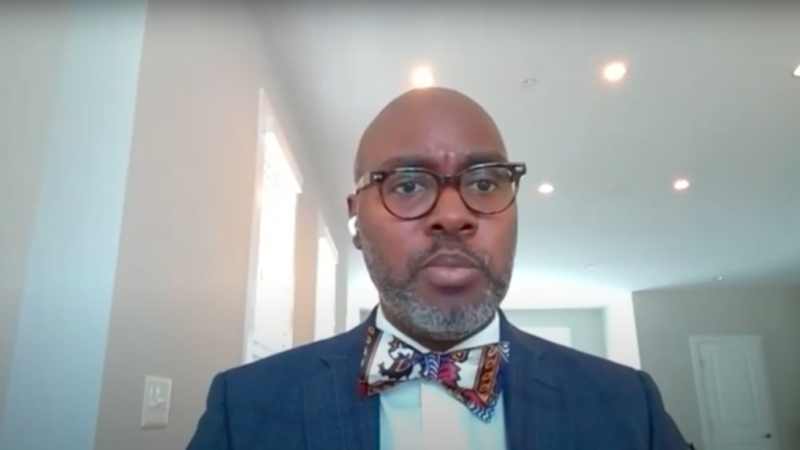Public School Superintendent Who Warned Pod-Based Learning 'Causes Inequities' Is Sending His Own Kid to Private School
Alexandria City Public Schools is still in virtual mode, and top education official Gregory Hutchings has enrolled his child elsewhere.

Alexandria City Public Schools (ACPS) Superintendent Gregory Hutchings has always been proud to call himself a parent of two children who attend public school. Until recently, his website and Twitter biography both made reference to his children's enrollment in ACPS.
But now, Hutchings has pulled one of his kids from ACPS—which remains all-virtual, to the frustration of many parents—and instead enrolled the child in a private Catholic high school currently following a hybrid model: some distance learning, and some in-person education.
"I can confirm that our family made a decision to change my daughter's school this school year," said Hutchings in a statement to Theogony, the student newspaper of ACPS's T.C. Williams High School, which first broke the news. "Decisions like these are very personal family decisions and are not taken lightly. This in no way impacts my absolute lifelong, commitment to public education, to which I remain as personally dedicated as ever."
The superintendent's office confirmed the statement in an email to Reason.
It's hard to blame Hutchings for trying to do right by his own child. But he is in a position to do right by thousands of other kids who don't have the same opportunity to simply opt-out of a completely inadequate Zoom education: He could prioritize reopening APCS, which is slated to remain all-virtual for the entire fall semester. One wonders why some in-person learning has been deemed a necessity for some families, but not others.
Moreover, Hutchings previously expressed concerns about parents seeking alternative educational arrangements. In a July 23 virtual conversation with parents and teachers detailing the district's fall plans, Hutchings fretted that in-person learning pods would cause some students to get ahead of their Zoom-based public school counterparts.
"The concern I have about that is, if this is something that's occurring for people who have the means in regards to bring in dollars and hire somebody and get their kids together, we can cause inequities," he said. "Even though we are intending to do the right thing, it can cause some inequities if some kids can do things and others can't."
Later during the conversation, Hutchings described pod-based learners as "privileged."
"If you're able to put your child in a learning pod, your kids are getting ahead," he said. "The other students don't get that same access."
Students enrolled in pod-based learning, private tutoring, or private schooling that involves in-person instruction are indeed better off than those languishing in virtual education. But that's a failure of public schools, which have largely chosen to privilege the demands of unions over the needs of children.
"Teachers unions have been an influential force against reopening schools even in cities and states where elected officials felt it could be done with reasonable safety," notes New York magazine's Jonathan Chait in a recent article. "The language and the logic of the pro-closing activism has treated the scientific case against in-person learning as a hardened fact."
Contrary to the macabre insistence of union leadership that school reopenings would result in mass death, in-person learning is now taking place all over the country with minimal evidence of significant COVID-19 spread. Families of means are making arrangements for their children to learn alongside other children—in person, the way it should be. Alexandria's school superintendent has made this choice for his own child. And yet the schools under his authority remain shuttered.


Show Comments (106)